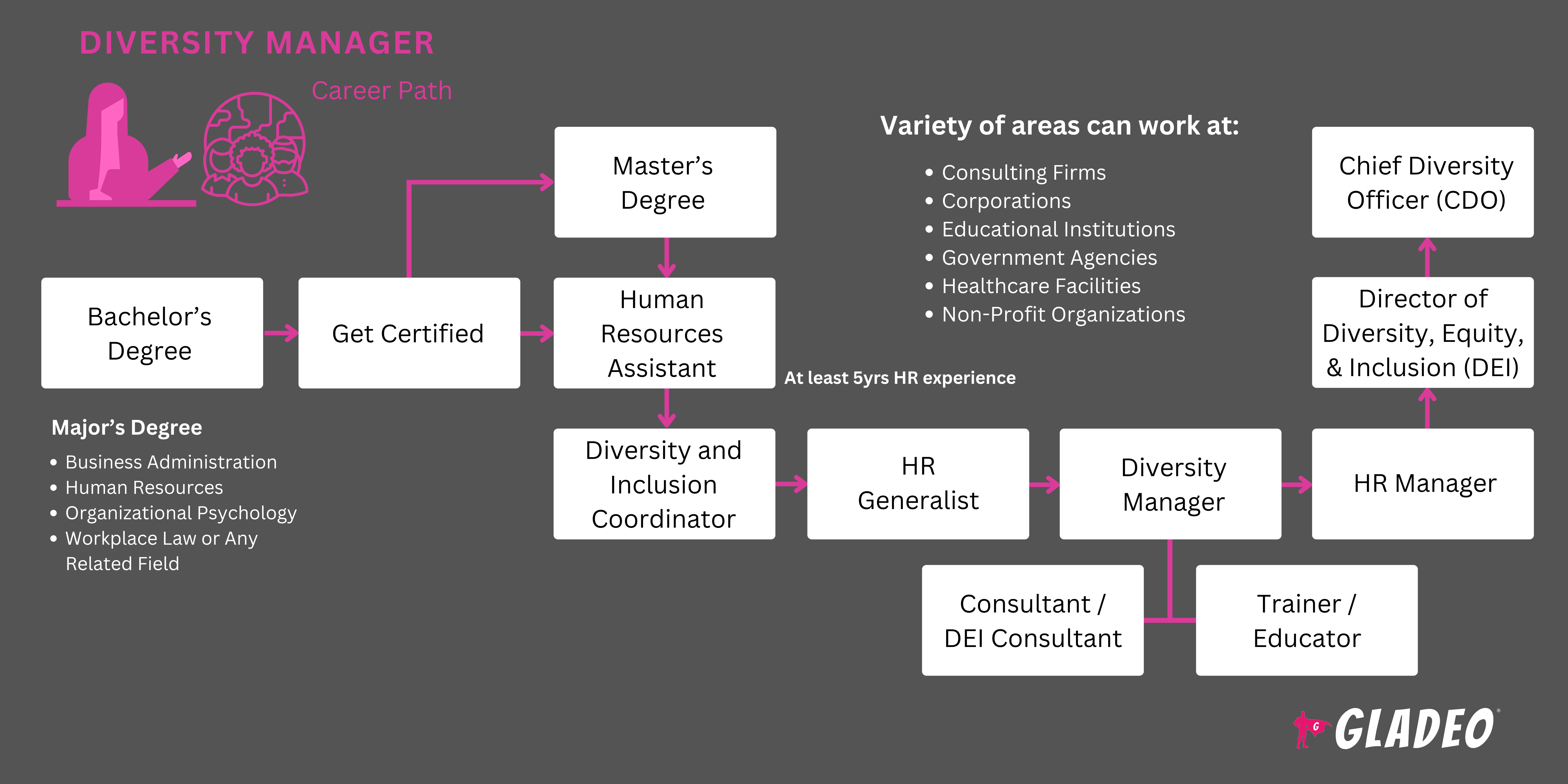Spotlights
Inclusion Manager, Equity Manager, Diversity and Inclusion Manager, Diversity, Equity, and Inclusion (DEI) Manager, Diversity and Belonging Manager, Cultural Diversity Manager, Equal Opportunity Manager, Diversity Programs Manager, Diversity Engagement Manager, Diversity Coordinator
In past decades, workplaces were often sorely lacking employee diversity, but modern initiatives have made great progress in changing that. Today, Diversity Managers, also known as Diversity and Inclusion Managers, help organizations find, attract, and retain talent from the broadest range of backgrounds possible.
Diversity Managers may begin by cultivating welcoming work environments and assisting in the development of recruiting initiatives aimed at attracting qualified applicants from diverse candidate pools. But their work also extends to ensuring equitability in hiring practices, as well as creating and instituting programs designed to enhance and maintain diversity in the workplace. It’s a rewarding career that’s helping to tear down barriers while strengthening organizations through inclusive practices.
- Ensuring fair, equitable hiring practices
- Creating opportunities for qualified candidates from disadvantaged or historically underrepresented populations
- Empowering organizations by facilitating greater inclusiveness to enhance the range of creativity, perspectives, and ideas available for decision-makers
Working Schedule
- Diversity Managers are full-time employees who typically work in offices but may occasionally need to make site visits which could take them out of town.
Typical Duties
- Research their employers’ current workplace climate and recommend areas for improvement
- Review organizational statistics to assess current levels of diversity
- Meet with management, team leaders, supervisors, and other staff to gather information and discuss problems and solutions
- Look at policies or practices to see which are supportive of diversity versus which might present obstacles
- Help establish short- and long-term diversity goals
- Develop ideas and strategies to help organizations reach those goals
- Work with recruiters and HR staff to update hiring and retention strategies
- Promote marketing techniques to make the organization more attractive to job seekers from diverse populations
Additional Responsibilities
- Provide or oversee related training for all organizational members
- Analyze performance review standards to ensure objectivity and fairness
- Collaborate with government agencies dealing with Equal Employment Opportunity guideline compliance and enforcement
- Stay up-to-date on diversity laws and best practices
Soft Skills
- Analytical
- Attention to detail and standards
- Collaboration and team-building
- Communication skills
- Coordination
- Critical thinking
- Data-driven
- Empathy
- Human resources
- Leadership
- Organizational skills
- Realistic
- Sound judgment
Technical Skills
- Evaluation and problem-solving skills
- Familiarity with HR software
- Project management
- Writing skills
- Government agencies
- Labor relations
- Human resources departments within private organizations
Diversity Managers play vital roles in today’s public and private organizations. They’re expected to be subject matter experts who can propose, establish, and implement policy-backed goals aimed at increasing workplace diversity and inclusivity. When members of an organization are reluctant to change or when leadership isn’t engaged, Diversity Managers may experience frustration as they must press forward with patience, understanding, and firmness. Ideally, they will put their skills to work to help unfreeze rigid mindsets and explain why changes are both positive and necessary. This may occasionally require difficult conversations, especially as Americans become increasingly polarized about social topics.
The push to increase diversity in the workplace started many years ago, and much progress has been made in recent times. However, diversity-related laws are subject to change as state and national leaders tend to come and go. Diversity Managers must not only help organizations understand and comply with such ever-evolving rules, but should also assist with establishing enduring internal guidelines which may withstand political shifts.
Vantage Circle notes several important trends that future Diversity Managers should keep an eye on. Among these are issues related to the evolving remote workforce and the multigenerational workforce. Older workers, for example, may not be as tech-savvy as younger ones.
Diversity Managers have to be careful to ensure other historically marginalized groups aren’t forgotten. For instance, qualified workers with disabilities often face employment barriers that must be recognized and addressed. Veterans, as a group, also experience challenges as they transition from military to civilian jobs.
Respecting diverse gender identity and expression is another topic that employers often need help navigating, as they strive for more inclusive, welcoming environments. Supporting positive mental health in the workplace is also an emerging consideration. Meanwhile, addressing bias, both conscious and unconscious, continues to be of critical importance.
Diversity Managers may have grown up in situations where they experienced bias or discrimination in their own lives, which may have instilled a desire to address such problems through institutional change. Growing up, they may have been keenly interested in reading and learning about civil rights topics, and how civil rights leaders employed different strategies to affect change. Diversity Managers have powerful soft skills which they may have honed through volunteering in student organizations in school or through community volunteerism.
- Candidates usually need at least a bachelor’s degree in Human Resources, Business Administration, Workplace Law, or Organizational Psychology
- Many employers prefer candidates who have a master’s degree, but this may be less important for smaller companies
- Ideally, Diversity Managers have acquired some practical HR-related work experience. For example, some companies may ask for five years of HR experience, of which three years should be related to EEO, affirmative action, and/or diversity programs
- The Society for Human Resource Management offers Certified Professional and Senior Certified Professional credentials for those qualify and pass their exam. These can help demonstrate dedication and competency to potential employers
- Other Diversity and Inclusion (D&I) certifications include:
- AIHR’s Diversity, Equity, Inclusion & Belonging Certificate
- American Management Association’s Diversity, Equity and Inclusion Certificate Program
- Catalyst’s Professional Certificate in Inclusive Leadership
- DiversityFIRST’s Certification Program
- eCornell’s Diversity and Inclusion Certificate Program
- ESSEC Business School’s Diversity and Inclusion in the Workplace
- HRCI’s Certificate in Diversity and Inclusion in HR Management
- Purdue University’s Inclusive Excellence Graduate Certificate Program
- Accreditation is always something to watch for. There isn’t a specific accreditation institution for HR-related degree programs, but check to ensure programs are nationally or regionally accredited. Some HR programs may fall under a university’s school of business. These are often accredited by the Association to Advance Collegiate Schools of Business. Online programs may be accredited by the Distance Education Accrediting Commission.
- The Society for Human Resource Management (SHRM) doesn’t accredit programs but does work with schools to help ensure their curricula are up-to-date with the industry. Check to see if your program aligns with SHRM standards.
Diversity Management students have plenty of educational opportunities, ranging from online and hybrid courses to full-time, on-campus programs at great schools around the country. U.S. News & World Report’s Colleges Offering a Human Resources Major offers a nice starting point for your program search!
- Stock up on classes related to English, writing, public speaking, debate, psychology, business, and health
- Participate in your school’s student council
- Volunteer for school activities where you can learn about teamwork, leadership, conflict resolution, and project management
- Apply for HR-related internships in your local community. Try to develop a well-rounded set of experiences that include HR as well as labor relations and nonprofit work
- Read up on diversity initiatives related to businesses you’re interested in
- Shadow a working Diversity Manager for a day. Ask if they have time to provide mentorship
- Watch videos and read books, journals, and online content about the field
- Visit or participate with local cultural centers to learn more about people from other walks of life
- Attend conferences and lectures about diversity topics. Consider applying to be a speaker yourself at such events
- Have meaningful, respectful conversations with those who share different viewpoints than you
- Sign up for a foreign language or sign language class!
- Write articles related to DEI and submit them to relevant websites or periodicals
- Consider knocking out additional certifications such as Society for Human Resource Management’s Certified Professional

- Many Diversity Managers start off as Human Resources professionals, gaining general HR experience before specializing in diversity
- As Games Industry writes, Diversity Manager jobs are “not a junior role, and starting off in a diversity and inclusion position straight away is unlikely.”
- HR internships can also be helpful to get some real-world practical experience
- Volunteering with relevant community organizations or nonprofits can also help build up your resume
- Sign up for alerts on popular job portals like ZipRecruiter, SimplyHired, Indeed, Monster, and Glassdoor
- Read through job ads carefully. If you’re missing any qualifications, go back and work on those so you’ll be competitive when applying
- Polish up your LinkedIn profile and share or write posts about DEI topics
- Ask people in your network for tips about job openings. It’s been said that the majority of jobs are found through networking and that most jobs are never posted publicly. In fact, that could be a systemic problem that Diversity Managers need to look into!
- Reach out to former professors and supervisors to see if they’ll serve as personal references
- Knock out a professional certification to beef up your application (see our Education and Training tab)
- Find out what resources your school’s career center offers
- Check out Diversity Manager resume samples and practice doing mock interviews
- Review Indeed’s How to Dress for an Interview
- Perhaps the best way to climb the ladder is to make positive, measurable changes in your organization. Apply all your knowledge and skills to making the improvements they hired you to help with
- Be a proactive problem solver and draw upon your patience and resilience when confronted with obstacles or stubbornness
- Lobby for more funding so you can access or provide needed resources and make a greater impact
- Demonstrate your ability to tackle increased responsibilities by showing leadership and offering to mentor others
- Work to constantly expand your knowledge base and stay up-to-date on developments
- Sign up for additional certifications and consider completing a graduate degree
- Hold teams accountable for compliance with DEI standards. Set the example for others to follow
- Be a team player, an attentive follower, and a strong leader. Earn a rep as someone who is competent and knows what they’re doing!
- Have discussions with your supervisor and ask about promotion opportunities. If you feel it is necessary to leave an organization in order to climb your career ladder, try to leave on the best terms possible
Websites
- Aspen Institute
- Code Switch
- Equal Employment Opportunity Commission
- General Assembly
- Illuminative.org
- National Council of Nonprofits
- Project Implicit
- Racial Equity Tools
- Society for Human Resource Management
- The Appeal
- The Communications Network
- The White House
- UCS’s Diversity Toolkit
Books
- Diversity in the Workplace: Eye-Opening Interviews to Jumpstart Conversations about Identity, Privilege, and Bias, by Bärí A. Williams
- How to Be an Inclusive Leader: Your Role in Creating Cultures of Belonging Where Everyone Can Thrive, by Jennifer Brown
- Subtle Acts of Exclusion: How to Understand, Identify, and Stop Microaggressions, by Tiffany Jana and Michael Baran
Diversity Management is a vital career field that is helping make a positive impact in workplaces and communities around the nation. But it can be a challenging job sometimes! Many professionals want to contribute towards DEI goals but without necessarily being in the thick of things each day. Alternative career options include:
- Compensation and Benefits Manager
- Director of Recruiting
- Diversity Consultant
- Diversity Coordinator
- Diversity Trainer
- EEO Investigator
- Equality and Diversity Auditor
- HR Manager
- Human Resource Information Specialist
- Labor Relations Consultant
- Supplier Diversity Manager
- Teacher
Newsfeed

Featured Jobs

Online Courses and Tools

Annual Salary Expectations
New workers start around $65K. Median pay is $101K per year. Highly experienced workers can earn around $160K.






